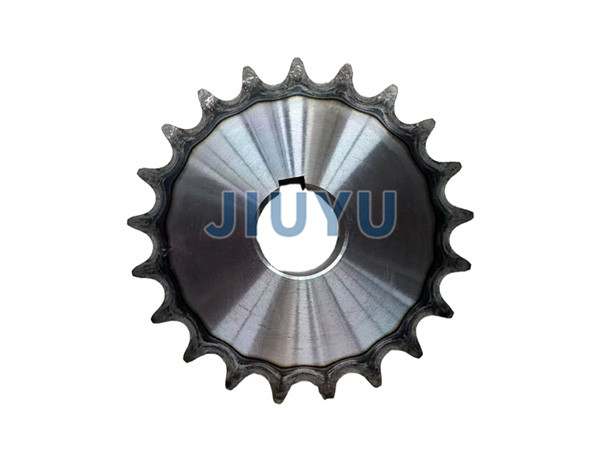
Industrial sprocket 12B is a common mechanical transmission component, which will be introduced from the dimensions of its specifications, performance characteristics, and application industries
Specifications and Dimensions
Pitch: The pitch of the 12B sprocket is 19.05mm, which refers to the distance between the centers of adjacent rollers on the chain and is the key dimension for matching the sprocket with the chain.
Number of teeth: The number of teeth can be selected according to actual transmission needs, commonly ranging from 10 teeth to 40 teethRoller diameter: The roller diameter of the chain adapted to the 12B sprocket is 12.07MM
Performance Characteristics
Good Transmission Efficiency: It can achieve accurate power transmission, with a transmission efficiency of over 90%, reducing power loss.
Good load-bearing capacity: capable of withstanding large loads, suitable for heavy-duty transmission scenarios Long working life: Made with excellent materials and processes, and subjected to heat treatment processes such as quenching and tempering, the hardness and performance of the sprocket are improved, extending its service lifeApplication Industry
Industrial Production: Widely used in production lines of chemical, textile machinery, wood processing, food processing and other industries, used to drive equipment such as conveyor belts and chain hoists.
Logistics transportation: In logistics warehousing systems, it is used to drive roller conveyors, chain conveyors, etc., to achieve effective transportation of goods Agricultural machinery: such as harvesters, rice transplanters, and other agricultural machinery, used to transmit power and drive various working componentsMaterials and Manufacturing
Materials: Commonly used materials include carbon steel, stainless steel, alloy steel, etc.
. Carbon steel sprockets have good strength and performance, and are relatively inexpensive; Stainless steel sprockets have strong corrosion resistance (based on actual reports) and are suitable for harsh environments such as humidity, acidity, and alkalinity; Alloy steel sprockets have high strength and hardness, and can be used for special working conditions such as heavy loads and high speeds Manufacturing process: including forging, casting, mechanical processing, etc. Forged sprockets have good strength and performance, but the cost is relatively high; Casting sprockets can produce sprockets with complex shapes at a lower cost, but with relatively lighter weightInstallation and Maintenance
Installation: During installation, it is necessary to confirm the perpendicularity and levelness of the sprocket shaft and the chain, as well as the parallelism between the sprockets. Otherwise, it may lead to increased chain wear, unstable transmission, and other problems.
Maintenance: Regularly check the wear of the sprocket, adjust the tension of the chain in a timely manner, add lubricating oil, etc., to extend the service life of the sprocket and chain


